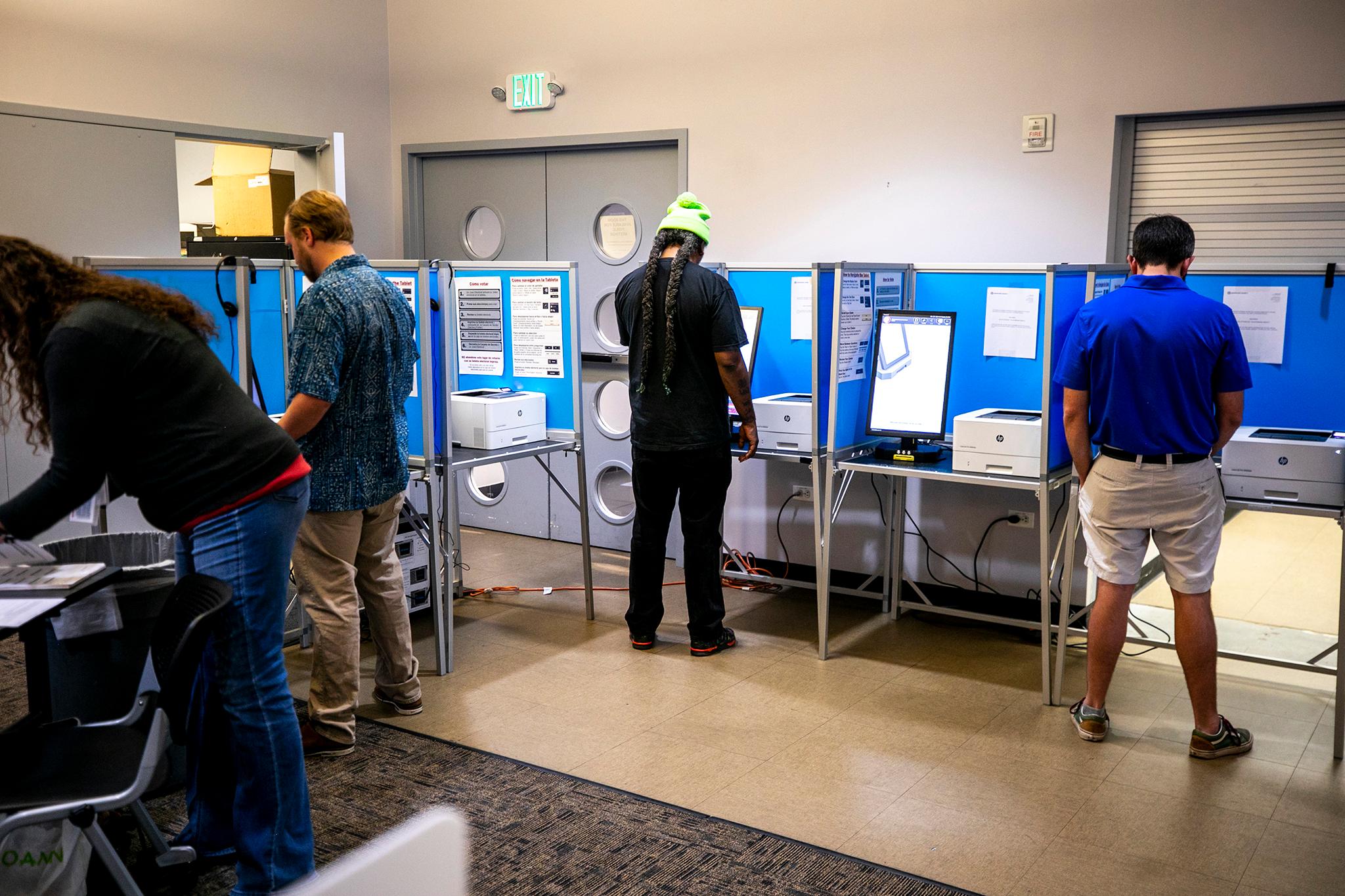
A plan backed by one of Colorado’s wealthiest people to dramatically reshape the state’s elections is moving forward.
Initiative 310 would fundamentally change both primary and general elections in Colorado for most state and federal races. It would eliminate single-party primary elections, instead creating an “all-candidate primary” in which all voters could participate. It would also switch general elections to ranked-choice voting.
For months, supporters and opponents waged a legal battle over the measure. But now, the ballot initiative has all the approvals it needs, including a favorable decision by the state Supreme Court. The next step is for its backers to start circulating petitions, an effort spokesman Curtis Hubbard said is already underway.
“We need to collect roughly 125,000 signatures from registered Colorado voters by the first week of August. And we fully intend to submit far more than that to qualify for the November ballot and to give voters the opportunity to demonstrate, once and for all, that elections belong to voters, not politicians,” Hubbard said.
The measure is backed by Kent Thiry, the wealthy founder of the dialysis company DaVita. With his money, it’s almost certain that the campaign can gather the signatures it needs to get on the ballot.
Supporters argue that these proposed changes will improve democracy by weakening the power of the parties.
They argue candidates would no longer be able to win primaries by appealing to the most extreme elements of their parties, who are currently among the most reliable primary voters. And the supporters argue that in the general election, ranked-choice voting would allow voters to support third-party candidates more freely, without fear of wasting their votes, bringing new voices into the political conversation.
“Politicians and candidates have to speak to the issues that voters care about as opposed to the extremes and trying to tear one another down,” Hubbard said.
At the same time, the measure has drawn intense opposition from officials within both major parties, as well as local election administrators.
“It's another way to try and decapitate political parties. And it's another way to advantage candidates who have a lot of wealth,” said Scott Gessler, a former Republican Secretary of State. Gessler worked as a lawyer for people who tried to block Initiative 310 earlier in the process and also has his own concerns about it.
He argues that party primaries give a range of candidates the chance to show their strength, while the real winners in “all-candidate” primaries are self-funded contenders who have the resources to get their message out to all voters from the get-go. And he believes that in general elections, ranked-choice voting will fall far short of the “snake oil” solutions that backers promise.
"We have two, three centuries of democratic tradition in the United States of America. And you're going to tell me, overnight, everyone, all of a sudden, is going to understand this new system?” he said, arguing that the complexity of ranked voting would lead many voters to spoil their ballots, as well as encourage gamesmanship from candidates.
The Initiative 310 campaign is being run by a group called Colorado Voters First. As of May 29, it had raised a half-million dollars, almost entirely from two donors. Kent Thiry contributed $250,000 in March, followed shortly after by another $250,000 from the political advocacy group Unite America. Thiry co-chairs Unite America alongside Kathryn Murdoch. A consultant also contributed $100.
The group has reported spending more than $400,000 already, with more than $250,000 going to the law firm Brownstein Hyatt Farber Schreck, which helped get the ballot language approved. Before settling on this specific initiative, its backers tried out scores of different measures before the state’s Title Board.
Now that the campaign is moving forward, Gessler predicted that Thiry would pour money into selling it to voters, with little organized opposition.
Still, opponents are mobilizing.
“Billionaires are trying to rig CO's elections to stifle the voice of everyday Coloradans by tossing a hand grenade into our democracy,” posted Shad Murib, chair of the state Democratic Party. (A spokesman for the campaign noted that Thiry is not a billionaire.)
Last week, a sizable group of organizations came out in opposition to Initiative 310, from labor interests like the Colorado AFL-CIO to nonprofits representing a diverse set of communities.
The group warned: "The proposed ballot initiatives backed by monied interests, would make confusing and hasty changes to Colorado’s election methods, creating a narrow window of time for implementation to ensure that elections are properly administered, and voters aren’t disenfranchised. It would be foolhardy and dangerous to trap new, untested methods into Colorado’s election systems where results would be difficult to audit and there would be a limited time to educate voters."
If the measure passes, Colorado would join only a couple of other states that conduct their elections in similar ways. Voters in Alaska approved a similar new system in 2020 for its primary and general elections. A similar reform to primaries and general elections is up for final approval by Nevada voters this year after passing initially in 2022. Oregon voters will consider shifting to ranked-choice voting, too, and Maine recently instituted RCV. California adopted a version of “all-candidate” primaries in 2011.
How it would work
If it’s eventually approved by voters this November, Initiative 310 would make two big changes for state and federal elections in Colorado:
- It would abolish partisan primaries for those elections in Colorado. Currently, each party holds a primary election in June. The members of each party, along with unaffiliated voters, select the candidates who will represent the parties in the general election. Initiative 310 would completely change that system. Instead, every voter would cast a ballot in the same “all-candidate primary.” The top four vote-getters would move on to the general election. The result could be two, three or even four members of the same party competing in the general election. There would no longer be an official candidate that is selected by a party.
- It would implement ranked-choice voting, also known as instant runoff voting, for general elections each November. Instead of choosing a single candidate, voters could rank some or all of the candidates based on their preference. All those rankings would then be processed together to determine the winners.
The proposal’s changes are meant to take effect in 2026, but state lawmakers recently passed a law that would delay or entirely block implementation. Still, Gov. Jared Polis said that if the measure passes, he’ll work to ensure that it is implemented by 2028.
The measure would apply to elections for the state House and Senate, for state offices such as governor, and for all Congressional elections. It would not apply to local or presidential elections.
Do you have questions about Initiative 310? Email the reporter and follow along for future coverage.
Editor’s note: This article was updated June 11, 2024 with additional information about what elections would be affected and to correct a description of Thiry’s wealth.









